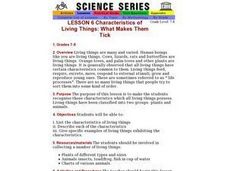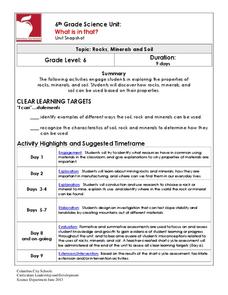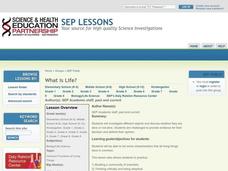Curated OER
Characteristics of Living Things: What Makes Them Tick
Students list the characteristics of living things and give specific examples of living things exhibiting these characteristics. They bring in examples of living things.
Curated OER
A Tree is an Ecosystem
Young scholars make observations about trees. In this ecosystem lesson, students observe and record all living and non living things they find under a tree, look for birds nests, evidence of woodpeckers and take samples such as leafs,...
Curated OER
Biodiversity
Students complete activities to study the importance of biodiversity. In this biodiversity lesson plan, students find images to categorize into organism groups and illustrate their interconnections. Students use measurement tools to...
Curated OER
Mini-Ecosystems
Third graders identify the living and non living things in a book read aloud and discuss the interactions represented in the book. Then, they research and include a list of food that each animal needs in an ecosystem. Finally, 3rd...
Curated OER
Ecosystems: Biotic and Abiotic Factors
Seventh graders examine proper journaling techniques, and record observations about at tree after listening to a read aloud of "Four Worlds: The Dine Story of Creation." They study the difference between living and non-living things, and...
Curated OER
What is Life?
Students investigate living and non-living organisms/objects foudn around the school in this technology-based science lesson. Adjustments to the lesson can be made based upon technological limitations.
Curated OER
Plan, Do, Review...What's Bugging You?
Students explore insects through literacy, In this literacy lesson, students discover the characteristics of ladybugs and gain information from the text, "The Grouchy Ladybug". Students go on a "bug hunt".
Curated OER
Plants and Animals: Alike and Not Alike
After reading an informative paragraph that outlines some of the differences between plants and animals, fifth graders attempt to correctly categorize 12 words in a word bank. They must put them in the plant, or animal category. This...
Curated OER
Can You "Gas" What's Happening?
Students examine gas production in "soil" samples through hands on activities and class discussions, to determine if the soil samples have contain living or non-living systems.
Curated OER
Parts of Ecosystems
In this ecosystem worksheet, students brainstorm and write down as many living and nonliving things found in an ecosystem. This worksheet is a graphic organizer.
Curated OER
Under The Sea
Second graders study how a tsunami is formed by underwater events such as earthquakes, volcanoes or landslides. They discuss what they knew about living and non-living things in the ocean.
Curated OER
Developing Environmental Awareness Through Problem Solving
Young scholars examine the relationships among living and non-living parts of the environment. Using their senses, they identify the objects in their classroom. In groups, they participate in experiments to discover where electricity...
Curated OER
Investigate Science Using Crayfish
Young scientists discover the importance of scientific investigation by observing live crayfish. They carefully observe the patterns of crayfish in different environments. Then they discuss their conclusions and define what all living...
Alliance Theater
The Jungle Book Post-Show STEAM Lesson
An ecosystem is really just the flow of energy through many different living organisms. A study of Rudyard Kipling's The Jungle Book leads to an environmental science activity in which learners study how various factors can affect...
Curated OER
Life Systems- Zoo Central
Students investigate the various aspects associated with living things while also concentrating on their basic needs. They explore the aspects of movement and growth in plants and animals. This is done through research and other...
Columbus City Schools
What is in that?
Invite your class to dig in to an engaging journey into the world of mining! Here you'll find the tools to equip young miners with knowledge of soil, rocks, and minerals, as well as types of mining operations. To round things out, the...
Curated OER
What Lives in Forests?
In this forest activity, students complete a graphic organizer by filling in 3 statements about what lives in a forest habitat.
Curated OER
Nuclear Fleas
Seventh graders distinguish characteristics of living things and identify the importance of careful observation. They identify five things that are not alive, but display characteristics of life and list five things that are alive, but...
Curated OER
What is Life?
Students investigate the characteristics of living things. In this life science lesson, students examine several living and non-living specimens. Students determine which things are living and non-living.
Curated OER
Scavenging the Sandy Shore
Students explore oceanography by examining a beach. In this living things lesson, students define the terms abiotic and biotic and practice identifying living and non-living things that have been previously found on a beach. Students...
Curated OER
Is It Alive?
First graders explore living things and their habitats. They create an original It's Alive! book to demonstrate what they have learned.
Curated OER
It's Alive
Students identify the differences between a nonliving and living thing. They describe what is needed for any living thing to survive. They create one page for the class book identifying why the object is a living thing.
Curated OER
Living, Non-Living Mobile
Middle schoolers are introduced to the concept of living and nonliving organisms in general and participate in a starter activity where they build their own definitions of living and nonliving organisms.They sort organisms into living...
Curated OER
Characteristics of Living Things
Seventh graders identify the characteristics of living and non-living things. In this biology lesson, 7th graders define vocabulary words as they go through the lesson. They answer a crossword puzzle after class discussion.
Other popular searches
- Non Living Things
- Non Living Organisms
- Non Living Things
- Laving and Non Living Things
- Lving and Non Living Things

























